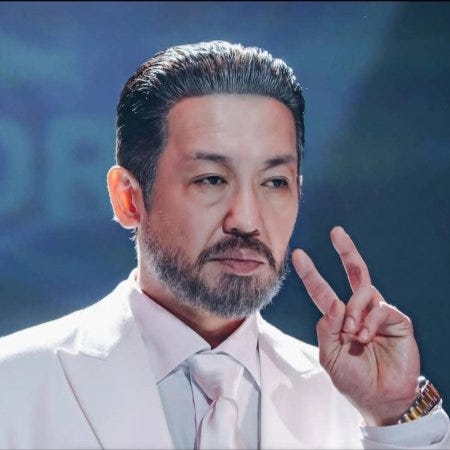Decoy Part 1 (2023) A Review
I’ve been in something of a drama drought with the current offerings but this one managed to catch my eye when Part 2 popped up on my Viki feed. It’s the first one in a while that I’ve been able to sit through past 3 episodes thanks to its solid script and decent performances particularly from Heo Seung-tae whose character is at the centre of at least two key mysteries in this noir detective police procedural.
The primary investigator of these mysteries is the reluctant Gu Do-han played by Jang Geun-suk, a thirtysomething lawyer turned cop who has been tasked by his superior Gang Jang-hoon (Lee Sung-uk) to get to the bottom of a series of murders all related to the man behind a nationwide pyramid scheme. He’s the newcomer to a history of money and mayhem and largely indifferent to the original fraud. He’s a murder only guy you see. 12 years earlier Noh Sang-cheon (Heo Seung-tae) scammed an entire nation with the help of people in high places and absconded to China with his ill-gotten gains. The official word is that he died in a car accident while hiding out on the mainland but his victims who lost everything would have none of it. The first ongoing mystery is whether Noh Sang-cheon still walks the land of the living. The other is — who’s bumping off all his former associates?
The first suspects are the victims of the scam who have formed a support group since the early days. They certainly have motive and one of them in particular shows up at the right place at the right time to be labelled chief suspect. It may seem like a muddle at first because there are so many faces parading across the two main time periods. The head-hopping may also pose a challenge to some. But the confusion is deliberate not just because of the non-linear storytelling but because obfuscation is undoubtedly the name of the game. It gives the appearance of being convoluted not only because the pieces of the puzzle are delivered in the “wrong” order but also due to competing agendas which are not clear to begin with. What are the murders about? Revenge? Cover-up? Even after 6 episodes, one can’t be sure.
Even though the show posits itself as a puzzle to be solved, it is at its core a character-driven piece of theatre. It is a well-trodden stage inhabited by all the usual suspects in K dramas. Dedicated cops, pathetic victims, higher-ups meddling in the investigation, perpetrators, and of course the crooked politicians. Where would a K drama be without corrupt politicians and bureaucrats? Despite traversing a familiar landscape, the plotting manages to be compelling and a mental challenge to those who want one. Like in every whodunit, everyone mixes truth with lies because they rationalize themselves into doing so. Even when that impedes an investigation that in the long run might be to their benefit. So it is really up to the primary investigator who is peeling onions and pulling weeds from an overgrown garden to understand the personalities behind the claims — dubious or otherwise.
Lee Elijah is Jeon Na-yeon, the child of two victims who fell prey to the alluring claims of Bigs Network. She’s active in the victim support group and writes for a small online news site determined to keep the story in public’s imagination. The downside is that she’s stuck in the past and it’s inevitable that she comes to blows with Gu Do-han for various reasons. She’s understandably resentful and mistrustful of law enforcement for letting them down. She’s been infected with a bad case of survivors guilt. So of course she gets in his way by withholding information and covering for others who are acting suspiciously.
More than the victims and the cops the most fascinating character of the show is Noh Seong-cheon not only because he’s the antagonist and an enigma but because he is a/the symbol/agent of chaos, resulting from the deterioration of the social fabric by corruption. He is the story’s equivalent of the Joker. An antithetical force that manipulates society’s moral code for nefarious activities. And I don’t just mean South Korea. He is a product of a nihilistic materialistic ethos that’s driven by expediency. He exploits human desires on a scale that devastates hearts and minds. Yet he mocks his victims as “weak” because they live their assuming that there’s a moral code underpinning their relationship with society based on trust. Without trust there can be no community but Noh Seong-cheon weaponises that to his advantage. What draws people to pyramid schemes (or multi-level marketing) isn’t necessarily greed as world weary cops might conveniently attribute to. It’s the promise of a better life. I’ve heard the sales pitch and it’s almost never about the money but what wealth can do for struggling plebs — the freedom to live the dream whatever that looks like. That’s the insidious part. The scam works because it taps into rudimentary aspects of human anthropology. Just think of Maslow’s hierarchy of needs for starters. Fear, sense of belonging, love to name but a few. Use that to one’s advantage and you have the audience in the palm of your hand. Politicians for instance (with notable exceptions) are masters of manipulating the populace using their knowledge of human behaviour to get them to play ball. They are the ultimate con artists.
Sadly this is the sort of show that won’t be watched by many compared to something insipid like Our Blooming Youth. Not matter how well it is written, it’s a bleak police procedural with not a slightest hint of romance. It’s dark world that we’re invited to with the use of grey and sepia filters but it holds out an element of hope as long as there are dedicated men and women who persist in breaking through the darkness and bringing the truth to light.



